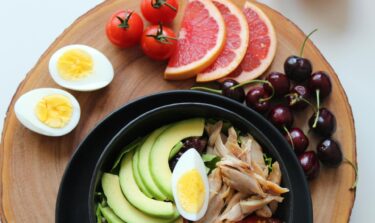
Natural appetite suppressants backed by science
Looking to manage your appetite naturally? Whether it’s emotional eating or unhelpful habits you’re trying to manage, you may be looking for natural appetite suppressants that are science-backed.
If you have a BMI over 35 and want support with managing hunger, Oviva may be able to help. Our NHS-funded programme combines personalised coaching with practical, sustainable advice around food, movement and lifestyle.
Key Takeaways
- If your appetite feels out of control, you might be missing key nutrients.
- The most effective natural appetite suppressant? A balanced, nutrient-rich diet with protein, fibre, healthy fats and complex carbs.
- Protein and fibre help you stay full for longer and manage overeating.
- Complex carbs like whole grains support steady blood glucose, reducing cravings.
What are natural appetite suppressants?
Natural appetite suppressants help you feel fuller for longer and curb hunger. These include high-fibre foods, protein-rich meals and healthy fats.
Drinking water before meals or eating filling, lower-calorie foods (like vegetables or broth-based soups) may also help reduce your appetite naturally.
They provide essential nutrients and support steady energy levels, helping to reduce hunger and cravings throughout the day.
There’s a big difference between foods shown to manage appetite and supplements marketed as herbal appetite suppressants— the latter typically have little or no scientific support.

What about weight loss medications?
It’s important to separate unproven supplements from prescription weight loss injections like GLP-1 agonists, such as Wegovy.
These medications aren’t natural, but they are clinically proven to reduce appetite by mimicking the GLP-1 hormone, which helps regulate how full you feel after eating. They’re not suitable for everyone and should only be used under medical supervision if you meet the eligibility criteria.
At Oviva, we may be able to offer these medications if you’re eligible, alongside personalised coaching from dietitians and other experts. Our focus is always on sustainable, long-term changes tailored to your lifestyle.
Types of natural appetite suppressants
Various appetite-suppressant foods can be eaten as part of a balanced diet to help reduce cravings and feelings of hunger.
Including certain foods that act as natural appetite suppressants in your meals can help reduce cravings and keep hunger at bay — especially when they’re part of a balanced diet.
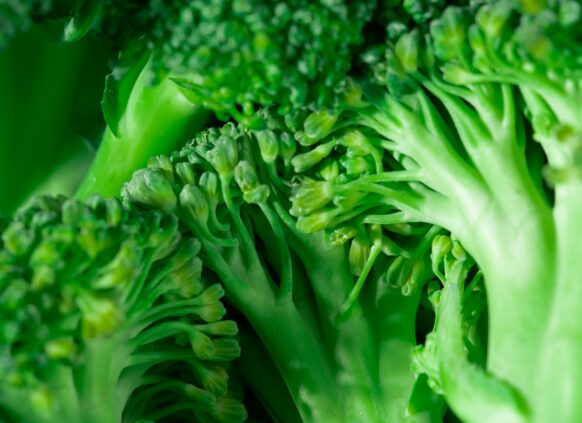
1. Vegetables
Vegetables are naturally high in fibre, which can help regulate appetite by slowing digestion and promoting fullness.
A recent study found that high-fibre diets may increase the release of peptide tyrosine tyrosine (PYY) — a hormone that signals fullness to your brain.
- Try filling half your plate with vegetables at main meals.
- A hearty vegetable soup can also be a satisfying, low-calorie option.
Fibre-rich vegetables include:
- Broccoli
- Brussels sprouts
- Kale
- Peas
2. Fruits
Whole fruits — not juices — can support appetite control thanks to their natural fibre content.
- Fruits like apples, berries, and grapefruits are high in pectin, a type of fibre shown to naturally suppress appetite.
- Top tip: juicing removes much of the fibre that keeps you full.
3. Sugar-free drinks
Did you know thirst is often mistaken for hunger? Hydration plays a key role in appetite regulation!
- Aim for 6–8 cups or glasses of fluids per day (NHS guidance).
- Limit fruit juice – it can spike blood glucose and lacks the fibre of whole fruit.
Choose sugar-free options such as:
- Water
- Herbal tea
- Coffee with low-fat milk
- Zero-sugar soft drinks
Some research suggests that sugar-sweetened beverages may actually stimulate appetite, so it’s worth limiting them where possible.
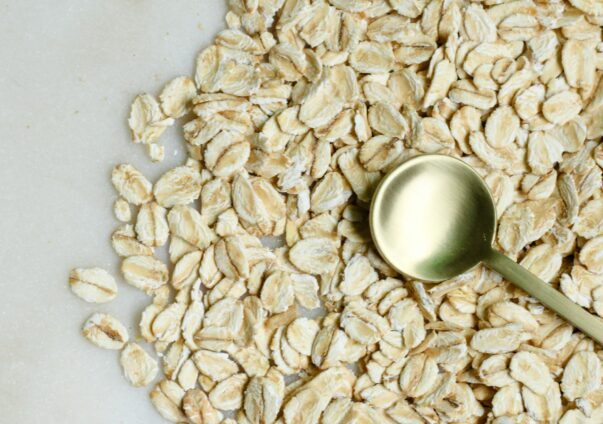
4. Oats
Oats are a great source of complex carbohydrates, which help:
- Keep blood glucose levels steady
- Prevent mid-morning hunger spikes
- Support long-lasting fullness
Try a bowl of oats with fruit, yoghurt or milk as a filling, appetite-managing breakfast.
5. Nuts
Nuts are naturally high in both protein and fibre, making them a filling snack that helps curb hunger between meals.
Stick to around a handful to keep portions balanced — nuts are nutritious but calorie-dense due to their fat content.
Choose unsalted options like:
- Almonds
- Peanuts
- Hazelnuts
- Cashews
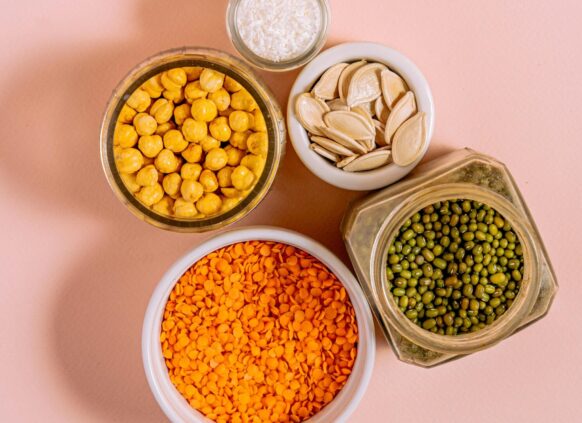
6. Legumes
Legumes offer a winning combination of high-quality protein, fibre, and essential nutrients.
The fibre in legumes absorbs water and expands in the stomach, helping to slow digestion and keep you full for longer.
Great options include:
- Chickpeas
- Lentils
- Kidney beans
7. Eggs
Eggs — particularly the whites — are a great source of high-quality protein with minimal carbohydrates.
Including eggs in your meals can help:
- Keep you fuller for longer
- Support stable blood glucose levels
Try them boiled, scrambled, or poached as part of a balanced breakfast or lunch.

Do natural appetite suppressants help with weight loss?
Many natural appetite suppressants — like foods rich in protein, fibre, or both — help you stay fuller for longer, keep cravings under control and can support healthy weight loss.
Here’s how they work:
- Fibre helps release appetite-regulating hormones, which signal to your brain that you’re full.
- Protein keeps your appetite satisfied and supports muscle maintenance — essential when you’re losing weight.
One study found that women who increased their fibre intake were more likely to lose weight, while those who decreased their fibre intake tended to gain weight.
Did you know?
If your body is lacking certain nutrients, it can increase your desire to eat. Eating a nutrient-rich diet also gives your body the vitamins and minerals it needs — and may help reduce persistent hunger.
Supplements vs. whole foods
Natural appetite suppressants, such as fruits, vegetables, whole grains, fibre, and protein-rich foods, have scientific evidence proving their effectiveness in keeping people satiated.
However, various “natural supplements” also claim to have an appetite-suppressing effect. These supplements don’t have robust evidence supporting their claims and are generally considered ineffective.
Much like with online diet pills, in some cases, they may even be harmful.
A study of natural supplements, including glucomannan, capsinoids, carnitine and chromium picolinate found they were “unlikely to contribute to meaningful weight loss” and “may contribute to harm”.
Some natural supplements also have gastrointestinal side effects.
If you’re looking to manage your appetite, whole foods are still the safest and most effective place to start.
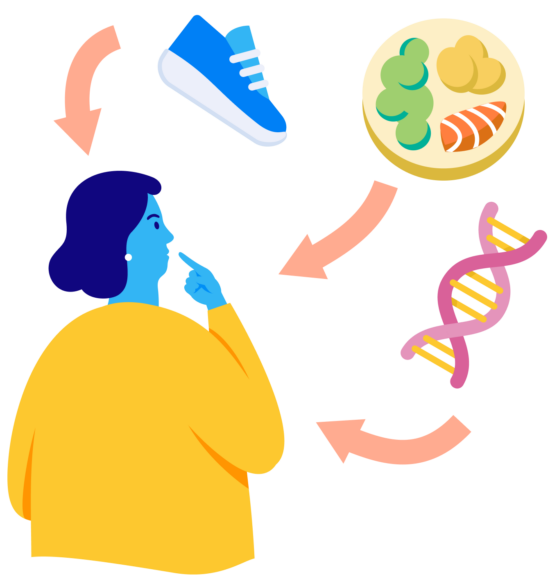
Ready for expert support?
Eating well and staying active are essential for long-term weight loss — but how do you build healthy habits that last? Oviva can help.
How Oviva supports your weight loss journey
Oviva is an NHS-funded weight management programme designed to help you lose weight without stress, calorie counting, or fad diets.
You’ll get personalised nutrition advice, expert-led coaching, and tools to support healthy habits that last.
What’s included:
- Log meals with a simple food diary
- Get expert feedback and support via in-app chat
- Set goals and track your progress
- Access daily tips and reminders
- Learn through short, evidence based lessons
If you have a BMI over 35 and a health condition like PCOS, type 2 diabetes, or heart disease, you may be eligible.



